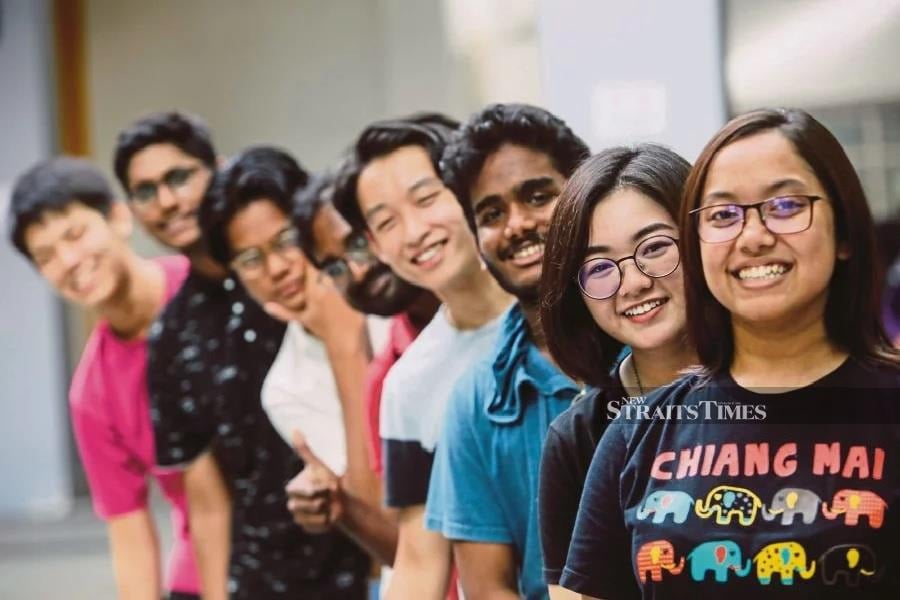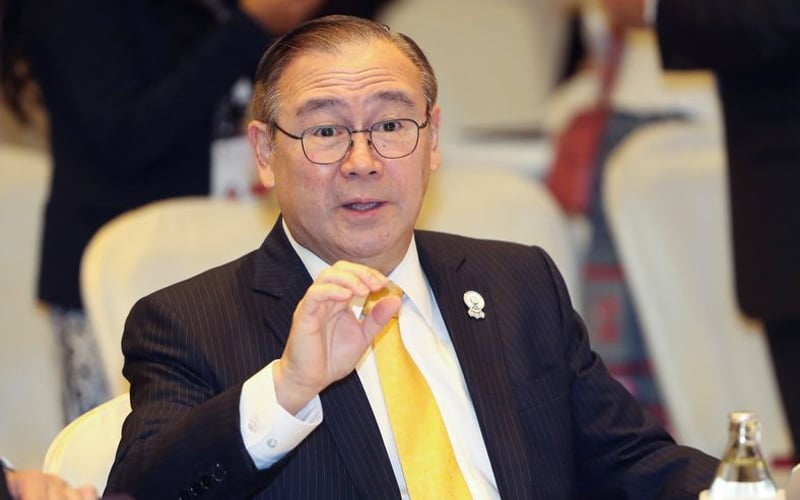
Published by Malay Mail & Focus Malaysia, image from New Straits Times.
Active and engaged youth participation to support the country’s administration can be a catalyst in achieving political stability, as it can be a creative force, a dynamic source of innovations, and can even catalyse important changes in political systems, power-sharing dynamics and economic opportunities.
Effective and meaningful youth political participation has one of three attributes – consultative; direct impact on decision-making within their own youth communities; and finally, collaborative participation, where young people effectively take part in regular political decision-making processes.
People under the age of 35 are rarely found in formal political leadership positions. In a third of countries, eligibility for the national parliament starts at 25 years or higher, and it is a common practice to refer to politicians as ‘young’ if they are below 35-40 years of age.
Youth is not represented adequately in formal political institutions and processes such as parliaments, political parties, elections, and public administrations.
Around the world, there is a growing interest in youth and politics. Some political groups are changing to respond to the growing number of young people who want to affect the political system. Political ideologies appealing to youth that were once considered “fringe” beliefs are becoming mainstreamed, and more young people are associating themselves with non-popular political parties.
More young people than ever before are becoming engaged in local community campaigns and other political activities. Youth can change the world through politics by becoming actively, meaningfully and substantially involved throughout political parties and beyond.
The system needs young people more than they need it. And it goes without saying – the way to create a prosperous future for a nation is by promoting the participation and involvement of youth in politics because they have the ability and the desire to shape their country’s future.
Undeniably, young people are an essential part of any democracy, including Malaysia.
In the recent parliamentary session, for instance, the fracas involving several senior Members of Parliament (MPs) and the MP from Muar YB Syed Saddiq Abdul Rahman – a clear example of how youth involvement in politics was still undermined and not given the respect it clearly deserves.
Even if they disagreed with the content of his presentation, he should have been allowed to complete his speech within the allotted time given to him. Parliamentary decorum must always be maintained.
The danger is not merely out-of-touch politicians; it is a growing sense of alienation and marginalisation amongst the rising generation of the world’s youth. Left unchecked, this disaffection can be exploited by nefarious voices hoping to bend young people toward their own, sometimes radical, cause.
To make a difference in the longer term, it is essential that young people are engaged in formal political processes and have a say in formulating today’s and tomorrow’s politics. Inclusive political participation is not only a fundamental political and democratic right but also is crucial to building stable and peaceful societies and developing policies that respond to the specific needs of younger generations.
For young people to be adequately represented in political institutions, processes, and decision-making, and in elections, they must know their rights and be given the necessary knowledge and capacity to participate in a meaningful way at all levels.
There are arguments both countering and supporting the idea that young people lack the maturity, experience, and knowledge necessary for making informed decisions. Many people who are older than the minimum age to vote in their countries could be said to lack these qualities; many who are over the minimum voting age are heavily influenced by others. There are countries that have challenged this stereotype of youth and lowered the voting age to make political participation more inclusive.
Going forward, we need to ensure that the support for the political participation of young people should extend across the electoral cycle. Capacity development for young candidates, for example, has proven to be more effective as a continuous effort than as a one-off event a few months before an election.
Young people who participate actively in their community from early on are more likely to become engaged citizens and voters. Another core principle is that youth political participation needs to be meaningful and effective, going beyond token gestures.
Capacity development is an integral measure, and while building individual capacities is key, the capacities of organisations and the degree to which an environment enables individuals and institutions to participate in political processes can also be factored in.
There are many examples of youth inducted into politics that have matured into effective leaders. Young people are not only enthusiastic and energetic but are also full of new ideas. They can instil freshness in the political affairs of their respective communities as well as the nation.
We can conclude by saying that many of today’s youth are highly intelligent and educated. They have a high awareness level. If they take part in politics, they will enrich it with their new ideas.
Therefore, it is about time to nurture the political awareness of youths by engaging them to overcome the challenges ahead, be it economic, social, or cultural through the institutions and processes of politics.
Farhan Kamarulzaman is Research Assistant at EMIR Research, an independent think tank focused on strategic policy recommendations based on rigorous research.
Diterbitkan oleh Berita Harian.
Penyertaan belia aktif untuk menyokong pentadbiran negara, dapat menjadi pemangkin mencapai kestabilan politik. Ia memberikan daya kreatif dan sumber inovasi dinamik, bahkan pemangkin perubahan penting dalam sistem politik, perkongsian kuasa dinamik serta peluang ekonomi.
Penyertaan politik belia berkesan dan bermakna mempunyai satu daripada tiga sifat – perundingan; kesan langsung terhadap pembuatan keputusan dalam komuniti belia sendiri dan akhirnya, penyertaan bersama yang orang muda mengambil bahagian dalam proses membuat keputusan politik secara berkala dan berkesan.
Individu berumur di bawah 35 tahun jarang ditemui dalam kedudukan kepemimpinan politik rasmi. Di sepertiga negara, kelayakan untuk Parlimen bermula pada umur 25 tahun atau lebih dan menjadi kebiasaan menyebut ahli politik sebagai ‘muda’ jika berumur di bawah 35 hingga 40 tahun.
Belia tidak mewakili secukupnya dalam institusi dan proses politik rasmi seperti Parlimen, parti politik, pilihan raya dan pentadbiran awam.
Di seluruh dunia, terdapat minat mendalam terhadap belia dan politik. Beberapa kumpulan politik berubah untuk bertindak balas terhadap peningkatan jumlah anak muda yang ingin mempengaruhi sistem politik. Ideologi politik menarik bagi belia yang dahulu dianggap sebagai kepercayaan ‘pinggiran’ menjadi arus utama dan semakin ramai anak muda membabitkan diri dalam parti politik yang tidak popular.
Lebih ramai anak muda terbabit dalam kempen masyarakat tempatan dan aktiviti politik lain berbanding sebelumnya. Belia dapat mengubah dunia melalui politik dengan terbabit secara aktif, substantial dan penuh bermakna dalam parti politik.
Sistem ini memerlukan orang muda. Sudah tentu cara mewujudkan masa depan sejahtera bagi sesebuah negara adalah dengan mempromosikan penyertaan dan pembabitan belia dalam politik kerana mereka mempunyai kemampuan dan keinginan membentuk masa depan negara.
Tidak dapat dinafikan anak muda ialah bahagian penting dalam mana-mana demokrasi, termasuk Malaysia.
Dalam Parlimen baru-baru ini misalnya, pertengkaran membabitkan beberapa Ahli Parlimen veteran dan Ahli Parlimen Muar, Syed Saddiq Syed Abdul Rahman ialah contoh jelas pembabitan belia dalam politik masih terjejas dan tidak diberikan penghormatan sewajarnya.
Meskipun mereka tidak bersetuju dengan isi pembentangannya, beliau seharusnya dibenarkan menyelesaikan ucapan dalam tempoh masa diberikan.
Bahayanya bukan sekadar ahli politik tidak sedar mengenai hal ini, bahkan rasa keterasingan dan peminggiran semakin bercambah dalam kalangan generasi muda dunia yang semakin meningkat. Jika dibiarkan, ketidakpuasan ini dapat dieksploitasi suara jahat yang berharap dapat membentuk orang muda ke arah sebab mereka sendiri yang kadang-kala radikal.
Bagi melakukan perubahan jangka masa panjang, orang muda perlu terbabit dalam proses politik rasmi dan memiliki suara dalam merumuskan politik hari ini serta masa depan. Penyertaan politik inklusif bukan sahaja hak asasi politik dan demokratik asas, bahkan penting untuk membangunkan masyarakat stabil dan damai serta merangka dasar memenuhi keperluan khusus generasi muda.
Bagi memastikan generasi muda dapat diwakili secukupnya di institusi politik, proses dan pengambilan keputusan serta pilihan raya, mereka perlu mengetahui hak mereka dan diberikan pengetahuan dan keupayaan untuk mengambil bahagian pada semua peringkat dengan cara benar-benar bermakna.
Terdapat hujah menentang dan menyokong idea ini bahawa orang muda kurang matang, berpengalaman dan berpengetahuan dalam keperluan membuat keputusan tepat.
Kita perlu memastikan sokongan untuk penyertaan politik anak muda seharusnya meluas di sepanjang kitaran pilihan raya. Pengembangan keupayaan calon muda misalnya, terbukti lebih efektif dengan usaha berterusan berbanding hanya beberapa bulan sebelum pilihan raya.
Pengembangan keupayaan ialah kayu ukur penting. Sementara membina keupayaan individu ialah kunci, keupayaan organisasi dan sejauh mana persekitaran membolehkan individu dan institusi untuk mengambil bahagian dalam proses politik juga perlu diambil kira.
Kita dapat membuat kesimpulan dengan menyatakan ramai belia masa kini sangat pintar dan berpendidikan. Mereka mempunyai tahap kesedaran tinggi. Sekiranya mengambil bahagian dalam politik, mereka akan memperkayakan dengan idea baharu.
Oleh itu, sudah tiba masanya untuk memupuk kesedaran politik belia dengan membabitkan mereka untuk mengatasi cabaran akan datang, baik ekonomi, sosial atau budaya melalui institusi dan proses politik.
Farhan Kamarulzaman merupakan Pembantu Penyelidik di EMIR Research, sebuah organisasi pemikir bebas yang berfokuskan kepada pencernaan saranan-saranan dasar strategik berteraskan penyelidikan yang terperinci, konsisten dan menyeluruh.

